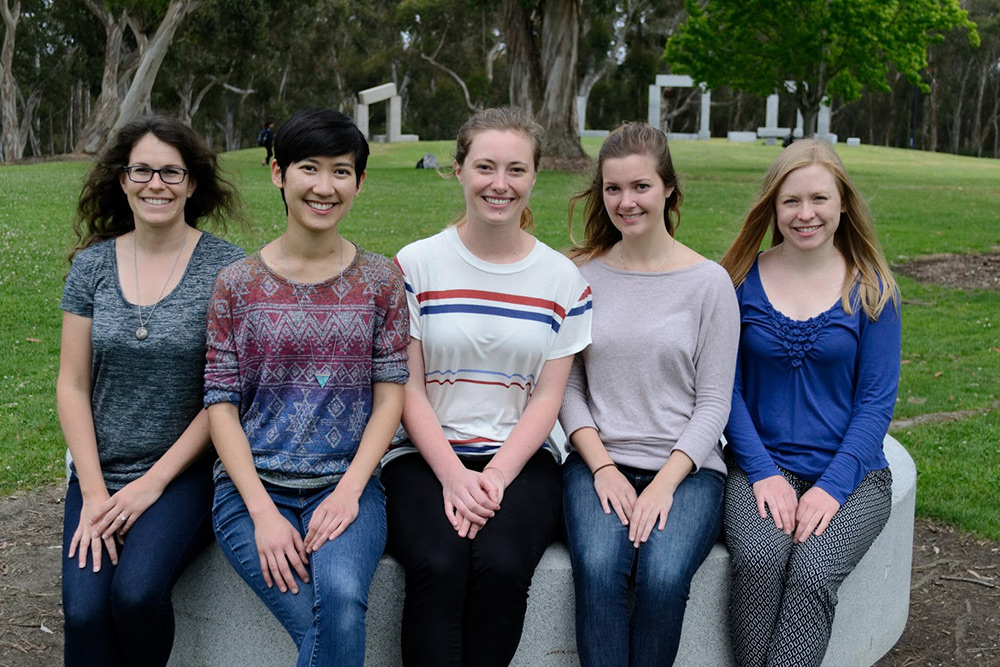Biology Students Receive Five Prestigious NSF Graduate Research Fellowships
Three honorable mentions also garnered in nationwide competition
May 4, 2017
By NSF and Mario Aguilera

Stephanie Nehasil, Amy Pribadi, Laura Chipman, Brooke Anderson and Angela Nicholson
Five students from UC San Diego's Division of Biological Sciences have been named award recipients in the National Science Foundation's Graduate Research Fellowship Program (GRFP). The program, which offers fellowships to applicants selected through a national competition, named 2,000 winners this year.
Additionally, three Division of Biological Sciences students were recognized with honorable mentions. Alumni of the Division garnered five awards and six honorable mentions.
"To achieve this caliber of success in such a highly competitive fellowship program speaks to the nationally recognized strength of our Division's graduate program and students," said Bill McGinnis, Dean of the Division of Biological Sciences. "At the same time, the wealth of recognition for our biology undergraduate alumni underscores the stellar education and training across our Division."
The five GRFP recipients are: Brooke Anderson, Laura Chipman, Stephanie Nehasil, Angela Nicholson and Amy Pribadi; honorable mentions: Xinyi Jenny He, Emily Pierce and Elizabeth Ryan. Alumni award recipients include: Mary Farruggia, Brandon Guell, Abdull Massri, Abraham Nguyen and Julien Roth; and alumni honorable mentions: Derek Bangs, Clinton Edwards, Lianna Fung, Shereen Ghosh (Georges), Austin Hsu and Joydeb Sinha.
"This unique program has nurtured economic innovation and leadership in the U.S. continuously since 1952—by recruiting and supporting outstanding students with high potential in science, technology, engineering and mathematics very early in their graduate training," said Jim Lewis, NSF acting assistant director for Education and Human Resources. "These talented individuals have gone on to make important discoveries, win Nobel Prizes, train many generations of American scientists and engineers and create inventions that improve our lives."
Awardees, chosen from more than 13,000 applicants, are selected through the NSF peer review process. They represent a wide range of scientific disciplines and come from all states, as well as the District of Columbia, and U.S. commonwealths and territories. The group of 2,000 awardees is diverse, including 1,158 women, 498 individuals from underrepresented minority groups, 75 persons with disabilities, 26 veterans and 726 undergraduate seniors. The awardees come from 449 baccalaureate institutions.
GRFP supports the graduate study of U.S. citizens, nationals and permanent residents attaining research-based master's and doctoral degrees in science, technology, engineering and mathematics (STEM) or in STEM education at institutions located in the United States.
A complete list of those offered the fellowship for 2017 is available on FastLane. For general information about the program, visit NSF's GRFP website.
About GRFP
GRFP is a critical program in NSF's overall strategy to develop a globally engaged workforce necessary to ensure the nation's leadership in advancing science and engineering (S&E) research and innovation. Former NSF fellows have made transformative breakthroughs in S&E, become leaders in their chosen careers, and been honored as Nobel laureates.
A high priority for NSF and GRFP is increasing the diversity of the S&E workforce, including geographic distribution, and the participation of women, underrepresented minorities, persons with disabilities and veterans.
GRFP provides three years of financial support within a five-year fellowship period ($34,000 annual stipend and $12,000 cost-of-education allowance to the graduate institution). That support is for graduate study that leads to a research-based master's or doctoral degree in S&E.
Fellows have opportunities for international research collaborations through the Graduate Research Opportunities Worldwide ( GROW) initiative and professional career development with federal internships provided through the Graduate Research Internship Program ( GRIP). GRFP also supports NSF's Career-Life Balance (CLB) Initiative ( NSF 13-099).
